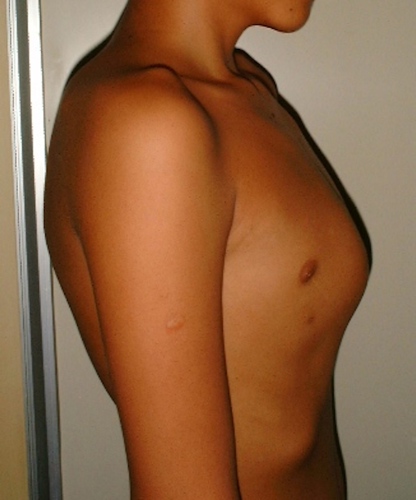
What are the chances that my kids will inherit Pectus Carinatum?
May 31, 2016

- Related Topics:
- Complex traits,
- Genetic conditions,
- Medical genetics
A graduate student from Belgium asks:
"I have Pectus Carinatum (PC) and am worried that my kids will have it too. How likely is it for them to get it? No one else in the family has it although my brother may have a really mild case."
Pectus carinatum (PC), as you probably know, is when someone has a difference in the way his or her chest wall is formed. It often looks like the chest sticks out farther than is typical.
Sometimes this condition can run in families, but it’s actually really hard to tell what the chance is that it could be passed on. We know that when more than one person in a family has it, it is more likely that other family members will get it too. But figuring out the exact or even reasonably close odds is next to impossible.
What we can say is that if it isn’t associated with any other condition, then the odds of your kids getting it are pretty low. Even if others in your family have it, the chance is not that high.
The reason we can’t do any better than this is because in most cases, PC is not a simple genetic issue. Lots of different genes and lots of things in the environment can all affect your chances.
Since we don’t know the genes or the environmental factors, we can’t really give strong predictions. This is why we are stuck saying that if it runs in families, then your kids are somewhat more likely to get it too.
What is a Pectus Carinatum?
Like I said above, a pectus carinatum (PC) is when the bones of the ribcage stick out and make the chest look different. Sometimes it is also called a “pigeon chest.”

About 1 in every 500 people has PC, with men more likely to have it than women. The good news is it usually doesn’t cause any medical problems.
When someone has PC without any other symptoms, we call it an isolated PC. But people with PC can sometimes have other atypical characteristics as well. It can be part of a bigger condition.
Maybe they have eyes that are further apart than usual. Maybe they have extra stretchy skin or even heart problems.
These are clues that a doctor can use to tell if there is another cause for the PC. When someone has several of these characteristics, it might mean that they have a genetic syndrome.
Having a genetic syndrome means a person is at risk to have problems with several parts of their body. There are some genetic conditions that include PC like Marfan syndrome and Loeys-Dietz syndrome.
It may not seem important, but figuring out what kind of PC someone has helps us figure out the chance that it gets passed on.
How Does Pectus Carinatum Run In Families?
There are different ways that PC can be passed on.
If someone has a genetic condition like Marfan syndrome, then we know exactly how it gets passed down. In this case, if one parent has Marfan syndrome, then each child has a 50% chance of having it too.
Scientists have even been able to figure out which gene is involved. People with Marfan syndrome often have mutations in a gene called FBN1.
That is just one example, but there are many more! For “simple” genetic conditions, figuring out the chances that a child will get it is relatively simple.

For isolated PC, when someone does not have other features associated with a syndrome, it gets a bit more complicated. Even though we know isolated PC can run in families, we aren’t exactly sure how it happens.
Isolated PC doesn’t always follow a simple pattern. Researchers also don’t know what gene or genes are involved in isolated PC.
What we do know is that it’s probably inherited in what geneticists call a multifactorial manner. This just means a lot of different factors affect the chances that a child will end up with isolated PC.
Genetics probably plays a role, but the environment does too. Environment can be just as important as genetics in some cases.
Take the womb, for example. Exposure to certain substances like alcohol in the womb can have major effects on a baby without any involvement of genes. We don’t know what environmental effects impact PC but there almost certainly are some.
You’ve probably heard of nature vs. nurture. Well, PC is sort of like both nature and nurture working in combination.

So What’re The Chances My Children Will Have Pectus Carinatum?
It sounds like from your description that you have isolated PC. If this is the case then there’s a low chance that your kids would have PC too. Because it is isolated PC and not associated with a condition like Marfan syndrome, we can’t put an exact number on this chance.
Since your brother sounds like he has a mild form of PC, there might be something in your family’s genetic makeup that makes them more likely to end up with it. We know that when more than one family member has it, there’s a greater chance it can happen again.
Even then, we can’t put a number on it. So let’s say that the chance your children have it is maybe higher than the average person, but it’s still low overall.
Questions like this are actually quite common in the genetics world. And it’s not that often that we have a “simple” answer for them. We still don’t understand how or why all genetic conditions occur.

Author: Chloe Reuter
When this answer was published in 2016, Chloe was a student in the Stanford MS Program in Human Genetics and Genetic Counseling. Chloe wrote this answer while participating in the Stanford at The Tech program.
 Skip Navigation
Skip Navigation
